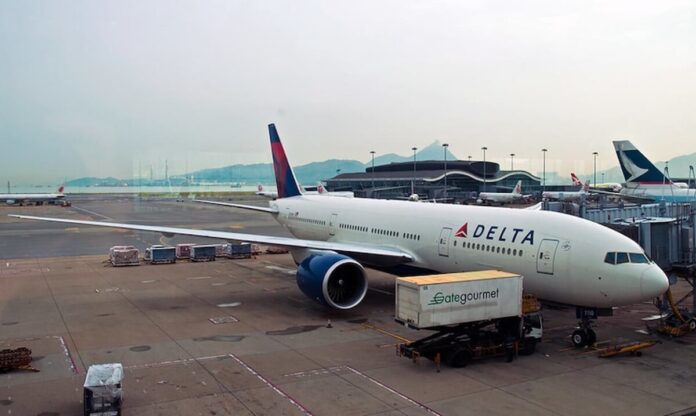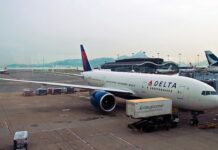
"Delta Airlines 777, Hong Kong, Sept. 2010" by In Memoriam: PhillipC is licensed under CC BY 2.0 .
Delta Air Lines is surveying passengers to explore their interest in “exclusive access to sports gambling (sportsbook) opportunities” to trial or explore on their devices through Delta’s Wi-Fi portal.
The question, buried among over a dozen proposed Delta Sync features, was shared on Reddit and has sparked speculations that the airline could be testing the waters for future in-flight sports betting.
Delta Has Already Partnered With DraftKings
The survey is not Delta’s first foray into the sports betting conversation.
The airline made headlines in January when it announced a partnership with sports betting giant DraftKings. The news raised numerous questions and scrutiny.
However, in February, Delta CEO Ed Bastian insisted that the partnership would not include cash, real-money gambling, or SkyMiles. Instead, it would feature free in-flight gaming powered by DraftKings technology.
The integration of DraftKings technology will be available via Delta Sync, the airline’s in-flight portal, which is accessible only to SkyMiles members using personal devices over in-flight Wi-Fi.
Delta emphasized that the DraftKings games will be purely for entertainment and customer engagement, not gambling.
A Win-Win Without Wagering
Although the initial partnership appears limited, Delta and DraftKings could gain substantially.
Delta, which flew around 200 million passengers in 2024, could use DraftKings’ powered games to drive customer engagement, SkyMiles enrollment, and monetize through advertising or referral deals.
According to the airline, in the first year of DeltaSync (February 2023 – February 2024), 39 million customers logged over 45 million streaming sessions onboard. Since then, the airline has continued to expand DeltaSync from about 650 to almost 900 planes.
If just 20% of the 200 million passengers (approximately 40 million) engage with the free DraftKings games, Delta has a larger sports-centric audience than Canada, which could be targeted after landing. Even a modest referral bonus by DraftKings per new customer could mean millions for Delta.
Meanwhile, DraftKings gains access to an audience of millions of passengers with limited distractions, without competition.
According to Delta, Millennials and Gen Z now make up 60% of all Delta Sync Wi-Fi users. That’s key to DraftKings, as these demographics are vital to the sports betting industry.
This could allow the company to reduce customer acquisition costs, which various estimates indicate are over $300 per new account.
As sports betting is now legal in almost 40 states, DraftKings can push state-compliant deposit offers the moment the passenger’s plane connects to the local network once they land.
The sportsbook also doesn’t have to worry about targeting users under 21. That’s because DeltaSync would restrict access to the free-to-play DraftKings-powered games to individuals under 21.
Can Delta Offer Real-Money Betting Onboard?
While Delta is inquiring about passengers’ opinions on sports betting, current laws prohibit onboard gambling.
The Gambling Devices Act of 1962 (known as the Johnson Act)prohibits transporting gambling devices in interstate commerce. Additionally, the Gorton Amendment to the Federal Aviation Administration Authorization Act of 1994 prohibited gambling on any plane flying to or from the United States.
Furthermore, placing bets mid-flight over state lines and transmitting bet data from the plane could be violations of the Wire Act and the Unlawful Internet Gambling Enforcement Act of 2006 (UIGEA).
Could Sports Betting Come to Planes?
It’s not unprecedented for a travel sector to embrace gambling.
US-registered cruise ships have been able to provide gambling via the 1991 United States-Flag Cruise Ship Competitiveness Act. This has led to some notable partnerships, including that of BetMGM and Carnival Cruises.
At the time, airlines lobbied for similar treatment, arguing that foreign carriers would gain an unfair edge (something the Gorton Amendment addressed).
Interestingly, Singapore Airlines and Swiss International Air offered in-flight gambling in the past. The latter used seat-based options, but discontinued them after a 1998 crash of a New York-Geneva flight. Investigations later discovered that faulty wiring in the entertainment system contributed to the crash.
For legal gambling on aircraft, Congress must amend the Johnson Act, repeal or amend the Gorton Amendment, and ensure compliance with the Wire Act and UIGEA. However, that’s much easier said than done. There are also the technology concerns based on the Swissair experience, and everyday pushback about the exposure to gambling.
Still, the financial appeal remains. In 1996, the Department of Transportation estimated that each aircraft could generate $1 million annually from gambling. Adjusted for inflation, that’s roughly $2 million today.
For Delta’s roughly 880 planes equipped with DeltaSync, that could amount to $1.76 billion annually. Even if Delta gets 10% of that, it would make $176 million each year. And it should be added that the US sentiment towards gambling has changed significantly since 1996. That means the number could be higher.
While the Delta-DraftKings partnership will initially be a free-to-play experience, this recent survey suggests that Delta is testing the waters for deeper engagement and laying the groundwork for future opportunities.












